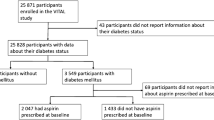ABSTRACT
BACKGROUND
The American Heart Association Guidelines recommend aspirin for all apparently healthy individuals whose 10-year risk of a first coronary heart disease (CHD) event is >10%.
METHODS
The United States (US) Preventive Services Task Force (USPSTF) has recently updated its guidelines to encourage men 45 to 79 years and women 55 to 79 years to use aspirin when the potential benefit outweighs the potential harm. In addition, in some US guidelines, diabetes is considered to be a CHD risk equivalent.
RESULTS
Two recently published trials, the Japanese Primary Prevention of Atherosclerosis with Aspirin for Diabetes (JPAD) and the Prevention of Progression of Arterial Disease and Diabetes (POPADAD), concluded that aspirin did not reduce risks of CHD. Both JPAD and POPADAD had inadequate statistical power. Reliable randomized evidence is necessary to provide a sufficient totality of evidence about benefits and risks among diabetics.
CONCLUSION
At present, astute individual clinical judgments are necessary.
Similar content being viewed by others
References
Hennekens CH, Buring JE, Sandercock P, Collins R, Peto R. Aspirin and other antiplatelet agents in the secondary and primary prevention of cardiovascular disease. Circulation. 1989;80:749–56.
Antithrombotic Trialists’ Collaboration. Collaborative meta-analysis of randomized trials of antiplatelet therapy for prevention of death, myocardial infarction, and stroke in high risk patients. BMJ. 2002;324:71–86.
Bartolucci AA, Howard G. Meta-analyses of data from six preliminary primary prevention trials of cardiovascular events using aspirin. Am J Cardiol. 2006;98:746–50.
Pearson TA, Blair SN, Daniels SR, Eckel RH, Fair JM, Fortmann SP, et al. AHA guidelines for primary prevention of cardiovascular disease and stroke: 2002 update: consensus panel guide to comprehensive risk reduction for adult patients without coronary or other atherosclerotic vascular diseases. Circulation. 2002;106:388–91.
US Preventive Services Task Force. Aspirin for the prevention of cardiovascular disease: US preventive services task force recommendation statement. Ann Intern Med. 2009;150:396–404.
Expert Panel on Detection, Evaluation and Treatment of High Blood Cholesterol in Adults (Adult Treatment Panel or ATP III). Executive summary of the third report of the National Cholesterol Education Program (NCEP III). JAMA. 2001;285:2486–97.
American Diabetes Association. Aspirin therapy in diabetes (Position Statement). Diabetes Care. 2004; 27(Suppl 1):S72–3.
Ogawa H, Nakayama M, Morimoto T, Uemura S, Kanauchi M, Doi N, et al. for the Japanese Primary Prevention of Atherosclerosis with Aspirin for Diabetes (JPAD) Trial Investigators. Low-dose aspirin for primary prevention of atherosclerotic events in patients with type 2 diabetes: a randomized controlled trial. for the Japanese Primary Prevention of Atherosclerosis with Aspirin for Diabetes (JPAD) Trial Investigators. JAMA. 2008;300:2134–41.
Belch J, MacCuish A, Campbell I, Cobbe S, Taylor R, Prescott R, et al; Prevention of Progression of Arterial Disease and Diabetes Study Group; Diabetes Registry Group; Royal College of Physicians Edinburgh. The prevention of progression of arterial disease and diabetes (POPADAD) trial: factorial randomized placebo controlled trial of aspirin and antioxidants in patients with diabetes and asymptomatic peripherial arterial disease. Prevention of Progression of Arterial Disease and Diabetes Study Group; Diabetes Registry Group; Royal College of Physicians Edinburgh. BMJ. 2008;337:a1840.
Manson JE, Grobbee DE, Stampfer MJ, Taylor JO, Goldhaber SZ, Gaziano M, et al. Aspirin in the primary prevention of angina pectoris in a randomized trial of United States physicians. Am J Med. 1990;89:772–6.
Hennekens CH, Buring JE. Epidemiology in Medicine. Boston, MA: Little, Brown and Company; 1987.
Early Treatment in Diabetic Retinopathy Study report 14. Aspirin effects on mortality and morbidity in patients with diabetes mellitus. JAMA. 1992;268:1292–300.
A Study of Cardiovascular Events in Diabetes (ASCEND). University of Oxford, Clinical Trial Service Unit Website. Available from: http://www.ctsu.ox.ac.uk/ascend/. Accessed December 3, 2008.
De Berardis G, Sacco M, Evangelista V, ACCEPT-D Study Group, et al. Aspirin and Simvastatin Combination for Cardiovascular Events Prevention Trial in Diabetes (ACCEPT-D): design of a randomized study of the efficacy of low-dose aspirin in the prevention of cardiovascular events in subjects with diabetes mellitus treated with statins. Trials. 2007;8:21–9.
Hennekens CH, Hollar D, Baigent C. Sex-related differences in response to aspirin in cardiovascular disease: an untested hypothesis. Nat Clin Pract Cardiovasc Med. 2006;3:1–3.
Rolka DB, Fagot-Campagna A Narayan KM. Aspirin use among adults with diabetes. Estimates from the third national health and nutrition examination survey. Diabetes Care. 2001;24:197–201.
ACKNOWLEDGEMENT
Dr. Hebert has no conflicts of interest to disclose.
Ms. Schneider is funded by the Charles E. Schmidt College of Biomedical Science, Department of Clinical Science and Medical Education and Center of Excellence at Florida Atlantic University (FAU) as Project Coordinator on two investigator-initiated research grants funded to FAU by Bayer testing the effects of aspirin dose on platelet biomarkers, inflammatory markers, nitric oxide formation, and endothelial function.
Dr. Hennekens is funded by the Charles E. Schmidt College of Biomedical Science, Department of Clinical Science and Medical Education and Center of Excellence at Florida Atlantic University (FAU) as Principal Investigator on two investigator-initiated research grants funded to FAU by Bayer testing the effects of aspirin dose on platelet biomarkers, inflammatory markers, nitric oxide formation and endothelial function.
Dr. Hennekens serves as an independent scientist in an advisory role to investigators and sponsors as a member of Data and Safety Monitoring Boards for ARRIVE, ASPREE and ASCEND.
Dr. Hennekens receives royalties for authorship or editorship of three textbooks and as co-inventor on patents concerning inflammatory markers and cardiovascular disease that are held by Brigham and Women’s Hospital.
Dr. Hennekens has an investment management relationship with SunTrust Bank who has sole discretionary investment authority.
Dr. Hebert wrote the initial draft of the manuscript, which was critically reviewed and revised by Dr. Hennekens. Wendy Schneider, MSN, researched the literature and assisted with revision and preparation of the manuscript.
Author information
Authors and Affiliations
Corresponding author
Rights and permissions
About this article
Cite this article
Hebert, P.R., Schneider, W.R. & Hennekens, C.H. Use of Aspirin Among Diabetics in the Primary Prevention of Cardiovascular Disease: Need For Reliable Randomized Evidence and Astute Clinical Judgment. J GEN INTERN MED 24, 1248–1250 (2009). https://doi.org/10.1007/s11606-009-1095-5
Received:
Revised:
Accepted:
Published:
Issue Date:
DOI: https://doi.org/10.1007/s11606-009-1095-5




